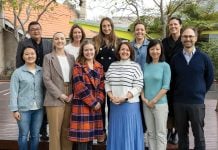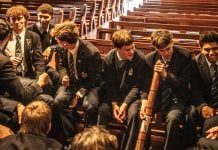Close Encounters of the Idea, a Year 9/10 English elective, introduces students to the principal concepts and questions of western philosophy through the medium of literature. Two texts underpin this exploration: Aldous Huxley’s novel Brave New World and The Wachowskis’ film The Matrix.
Students are encouraged to consider some of those big questions human beings feel compelled to ask: What can I know? How should I live? What is just? What is real?
An idea, once born, grows like a student into maturity. The greater the encounter, the greater the growth.
Here, Year 10 student Ryan Mooney highlights the thinking and ideas discussed within the subject.
As I reflect upon my close encounters with the big ideas presented in both Aldous Huxley’s Brave New World and the Wachowskis’ film The Matrix, I realise just how profoundly these two works have impacted my outlook on both literature and life in general and caused me to ask many unexpected questions.
I am reminded of the Mad Hatter’s offer to Alice (in Through the Looking-Glass) to meet her “in the gardens of memory, in the palace of dreams”. When Alice objects “but a dream isn’t reality…”, the Hatter responds, “Who’s to say which is which?”
My study of both texts introduced me to new branches of philosophy, inspiring me to consider certain principles for the first time. Beginning in a science-fiction world which prioritises stability, infantilisation of adults, mindless replication, and consumption above all else, Huxley’s Brave New World caused me to question what it truly means to be human.
As a class, we explored the necessity of emotions, individuality, and freedom, all of which are compromised in The World State. I came to realise that without these essential features of our species, we largely lose our humanity, making us no different to worker ants.
My study of this novel leaves me with a greater appreciation for all these factors of our humanity and cultures which reveal our differences.
Subsequently, we explored the dystopian universe of The Matrix, in which humankind is unknowingly trapped inside a simulated reality. Through my study of this film, I was introduced to the large philosophical branches of metaphysics and epistemology, both responsible for the big questions such as “What is real?” or “What can I know?”.
Whilst my studies into these fields have certainly enriched my philosophical understanding, causing me to question the nature of my own reality at times, it was the lessons of Neo’s Hero’s Journey which stuck with me the most. As a result of his escape from the simulation and achievement of “enlightenment” by the end of the film, I have learned that we are ultimately the agents of our own lives, and able to chart our own courses.
This subject not only endowed me with intriguing philosophical knowledge and wisdom, but, more importantly, it caused me to consider how I choose to view and understand the world around me.



